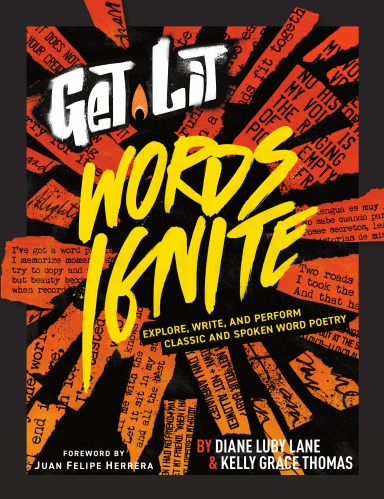How do you structure your poetry writing workshop activities and exercises for high school students in your poetry club or creative writing classroom?
I use four different approaches to planning poetry writing activities with high school students. As a club sponsor/youth spoken word coach, I don’t have much leverage or time with my students. I have to appeal to their passion for poetry. We do some light analysis of poems, but I focus on what appeals to them (or not) about a poem. We talk about how to read the model poems as a writer. In other words, I ask them, “What can you steal from this poem to use in your own writing?”
The approaches I use could be summed up as follows:
- Lists or word banks related to their experience
- Apprenticeship with a poem by close reading
- Constraints put in place to break poets out of patterns
- Skill-building that focuses on specific writing skills
I wrote two books that have examples of all of these types of approaches. If you are interested, check my Link.tree.
Idea Lists

I live and work outside of Chicago. My first exposure to youth spoken word poetry and poetry slams was through Young Chicago Authors (YCA). In their writing workshops, YCA employs a specific theme, e.g. “important people in our lives” or “our names.” These themes show up in one or two example poems. First, workshop leaders lead a discussion about the poems. Then students generate several lists based on the poems. For a workshop about names, examples might include “nicknames you were given” or “times someone mispronounced your name.” Finally, the workshop leader gives a writing prompt: “write a poem that talks about your relationship with your name.” YCA’s website has some model workshops in the Stay Making section of their website.
Poem Apprenticeship

I admire the work of Get Lit, a Los Angeles-based Youth Spoken Word writing organization, similar to YCA. Get Lit uses a more academic approach. Students start by choosing a poem they want to apprentice themselves to, aka a “classic poem.” In other words, they select a poem from Get Lit’s Anthology that they are willing to spend a lot of time with. Next, they do a close reading of the poem, reading it as a writer. What poetic elements does the poet use? How do these elements affect the meaning of the poem? Because they are also learning performance, students then memorize and perform their chosen poem. Finally, students create a “response poem” of their own.
The poet might respond to (1) a specific line or word in the classic poem (2) the topic of the poem itself (3) or a stanza, feeling, or idea. In essence, their poem is in conversation with the classic poem. During Get Lit’s Classic Slam, the poets perform both the original classic poem as well as their response poem. For a book-length resource, pick up a copy of Words Ignite.
Constraint Exercises
Constrained writing is a common and very old technique. Generally, beginning writers stick to the same writing moves in their poems. Complicate the prompt with rules or requirements and break your poets out of those patterns. Write sonnets or require a poem to include a list of provided words. There are tons of different poetry writing exercises you can use by themselves or in combination with others.
Here is an example prompt for a love poem:
- As a whole group, brainstorm a list of words that have to do with love (mainly nouns & verbs).
- Then pick a specific subject for your love poem. It can be romantic or platonic.
- Now write a ten – fourteen line love poem.
- But the catch is that you can not use any of the words from the brainstorming list in your poem.
Skill-building Exercises
After a few years of planning high school poetry writing workshops, I found that just providing example poems and prompts wasn’t enough. My young poets needed to build their basic poetry writing skills through skill-building exercises. The difference with this method is that there is no poem as a product expected at the end. Instead, the focus is on learning and trying out a skill.
Some examples include: developing original metaphors & similes, dealing with line breaks, revising your poem & offering feedback, using rhyme effectively, etc.
How do you structure your poetry writing workshops for high school students in your poetry club or creative writing classes? Please share ideas in the comments.
Discover more from eric bodwell
Subscribe to get the latest posts sent to your email.
